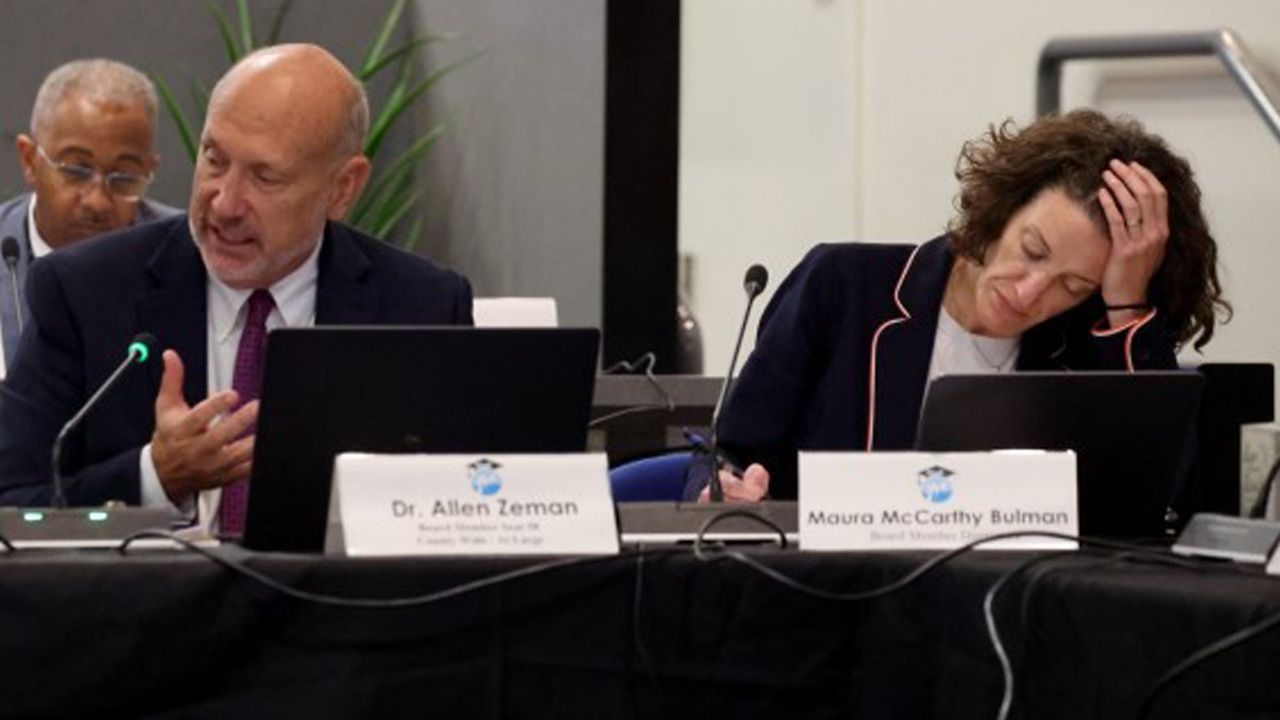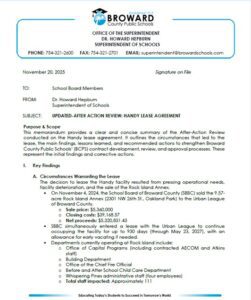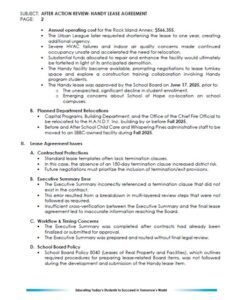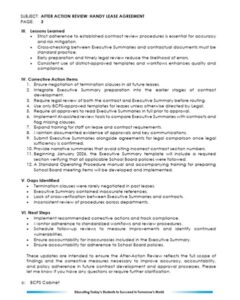
Broward schools’ $2.6 million office rental contract plagued by missteps
South Florida Sun Sentinel | By Scott Travis |
The Broward School District made a series of blunders when it entered into a $2.6 million office rental contract, including failing to demonstrate a need for the space, failing to negotiate favorable terms for the lease and selecting a space that was too small to meet the district’s needs, public documents reveal.
Superintendent Howard Hepburn sent a three-page after-action review to School Board members on Nov. 18, explaining what prompted the district to rent space from the nonprofit group Handy to house more than 100 facilities employees, as well as lessons learned. The South Florida Sun Sentinel also identified a number of questionable actions during a review of public records, prompting Hepburn to send out an updated review on Nov. 20.
“We continue to acknowledge that there were issues associated with the lease,” district spokesman John Sullivan told the Sun Sentinel. “The Superintendent has been closely reviewing all processes involved and initial corrective measures have already been implemented. Staff will continue making improvements to ensure stronger oversight, clearer review processes, and adherence to School Board policy.”
The School Board on June 17 approved the lease with Handy, whose full name is Helping Advance & Nurture the Development of Youth, to occupy two floors in their recently acquired headquarters in Wilton Manors. But after a Sun Sentinel story on Oct. 24 led to a public backlash, the School Board voted on Nov. 4 to seek to terminate the lease.
School administrators had struggled to explain why they had agreed to pay more than $500,000 a year for five years to rent space for facilities employees when the district is facing budget cuts and has numerous vacant classrooms that could be converted into offices.
Hepburn’s first after-action review memo identified some mistakes, including a lack of an easy termination clause in the lease as well as false information published in an executive summary on the June 17 School Board agenda, where the item was approved.
He revised his memo on Nov. 20, with a change addressing an issue raised by the Sun Sentinel: the district’s failure to follow its leasing policy.
The policy says that for outside rentals, the executive summary for the School Board agenda item must provide proof that there are no district-owned facilities that could be used instead. No such assurance was included on the summary.
The policy also states that a new lease must be placed on a School Board agenda 90 days prior to commencing, but the Handy lease took effect on June 17, the same day it was approved.
“Beginning January 2026, the Executive Summary template will include a required section verifying that all applicable School Board policies were followed,” Hepburn wrote in his revised memo.
Hepburn wrote in both versions that the decision to lease the Handy building was prior to an “unexpected, significant decline in student enrollment” and “emerging concerns” about a new law that allows certain charter schools to share space rent-free with underenrolled schools.
While the district’s 10,000 enrollment drop was higher than expected, district officials still knew they would likely lose thousands of students months before the Handy lease was approved. The district’s chief financial officer told the School Board on April 9 that a state report estimated an 8,800 student drop.
The charter school law has prompted the School Board to look into closing schools, leasing space to cities and nonprofit groups and using vacant classrooms for offices.
The district’s desire to find new space was the result of its sale of an old office complex in Oakland Park known as Rock Island Annex. The Urban League of Broward County, which bought the property from the district for $5.36 million on Oct. 28, 2024, plans to replace the buildings with affordable housing.
Right after the sale, the district entered into a lease with the Urban League that allowed it to stay in the buildings through May 23, 2027.
But Hepburn wrote in his after-action memos that severe air conditioning and heating failures, as well as indoor air-quality concerns at Rock Island, “made continued occupancy unsafe and accelerated the need for relocation. Substantial funds allocated to repair and enhance the facility would ultimately be forfeited in light of its anticipated demolition.”



Urban League also requested shortening the lease to a year, “creating additional urgency,” Hepburn wrote.
The after-action reviews gave few details on why the district considered the Handy building its top choice to house Rock Island employees.
“The Handy facility became available, prompting negotiations to lease turnkey space and explore a construction training collaboration involving Handy program students,” Hepburn wrote.
Officials from Handy, including CEO Kirk Brown and top officers on the executive board, could not be reached for comment, despite attempts by phone.
The district’s interest in the building, which is at 2101 N. Andrews Ave. in Wilton Manors, started before Handy even owned it.
In a letter addressed to Brown dated Nov. 8, 2024, Hepburn said the district wanted to enter into a five-year contract to lease space at the property that would become Handy’s future home. The Sun Sentinel received the letter through a public-records request.
In the 2024 letter, Hepburn wrote that the district is seeking about 12,000 square feet of office space, with 85 designated parking spaces and would pay $395,000 per year. The final agreement was for 15,000 square feet starting at $510,000 a year, as well as 75 designated parking spaces.
“We look forward to further discussions regarding the lease terms and are hopeful to proceed with finalizing the lease agreement,” Hepburn wrote, referring Brown to Chief Operating Officer Wanda Paul if he had additional questions.
Hepburn’s letter of interest was drafted two months before Handy bought the building from Moss Construction on Jan. 9, 2025, for $5.9 million.
District emails show that on April 29, Dailey forwarded a lease she’d received from a Handy representative to Tom Cooney, a school district lawyer, for a legal review.
Cooney wrote to Dailey on May 15 that the proposed agreements contained terms not favorable to the school district, including a clause agreeing to defend and indemnify, or hold harmless, the landlord from liability.

The Handy building at 2101 N. Andrews Ave. in Wilton Manors, Thursday, Oct. 23, 2025.
Cooney asked Dailey if her boss, Chris Akagbosu, director of facilities planning and real estate, “reviewed and agreed to support a recommendation to the Board for approval of the proposed lease.”
“This lease is being brought before the Board per the directive from upper administration,” Dailey responded. “The indemnification clause usually favors the landlord. If, in your professional opinion, it should be revised, please redline as necessary.”
On May 27, Paul, the chief operating officer, emailed Cooney for an update on his legal review.
He responded that the lease contains “terms not typically considered for approval by the School Board. Typically, I would return similar forms of agreement to the other party (Landlord, in this case) with desired revisions; however, in this instance, it is my understanding that District Administration desires to recommend approval of this lease agreement as written. Therefore, I will execute the document as to form and legal content.”
Sullivan did not respond to the Sun Sentinel’s questions about whether someone in upper management directed the lease to be sent to the School Board, and which administrator that may have been.
The decision to proceed with the contract despite the warnings of Cooney angered School Board member Adam Cervera, who is a lawyer specializing in real estate.
“Our lawyers are telling staff they have issues with it or changes are needed, and it seems like our staff is overriding legal,” Cervera told the Sun Sentinel. “We are paying our lawyers millions of dollars collectively to give us legal advice and input. Why are we not listening to them?”
Hepburn’s memos addressed the issue by stating, “Strict adherence to established contract review procedures is essential for accuracy and risk mitigation.”
In the days before the Handy lease came to the School Board, Paul met with board members individually to explain it and answer questions.
An executive summary drafted by Paul’s office said the Handy building would be cheaper than staying in the Rock Island building.

Wanda Paul, chief operations officer at Broward County Public Schools, listens during the special meeting on Tuesday, Nov. 4, 2025. The board voted to rescind the five-year agreement the School Board approved June 17 with Handy, whose name stands for Helping Advance and Nurture the Development of Youth.
The $510,000 annual rent for the Handy building included utilities, maintenance and custodial service, the summary said. While the district doesn’t pay rent at Rock Island, it does pay utilities and operating costs, which the summary estimated at $566,355 per year.
“I had the pleasure of speaking with Mrs. Paul who answered my questions,” Board member Maura Bulman said at the meeting on June 17 when the lease was approved. “I just wanted to point out what she told me. First of all, everyone will be moving out of the current space, and the new accommodations will be considerably cheaper.”
But the summary didn’t include all costs at Handy, leaving out an $85,000 deposit, which was revealed at a Nov. 4 meeting, and $88,000 in technology upgrades, which the Sun Sentinel found through a public-records request.
The information prepared for the June 17 School Board agenda contained a number of errors.
A chart compared the cost of the Handy building to other facilities in the area, but listed the facility as being built in 2000. Most other publicly available sources, including the Broward County Property Appraiser’s Office, list it as being built around 1975.
The error that especially angered School Board members related to a termination clause. The executive summary gave conflicting numbers about how much notice was needed to terminate without cause, listing both 90 days and 180 days simultaneously. But neither was correct. Other than for damage, the only way the district could cancel the five-year lease is if the School Board fails to allocate the expense in its annual budget, Cooney told Paul in an Oct. 27 email.
“The Executive Summary incorrectly referenced a termination clause that did not exist in the contract,” Hepburn’s after-action review stated. “This error resulted from a breakdown in multi-layered review steps that were not followed as required.”
Hepburn wrote the district would implement changes, including ensuring termination clauses are negotiated in all leases. Lawyers would review both the contract and executive summary before they come to the board, and school-district-approved templates would be used for leases unless otherwise directed by district lawyers, Hepburn wrote.
After the lease was approved, the district’s facilities staff attempted to move into the Handy building but faced complications.
Greg Boardman, a facilities project manager, said in an Aug. 25 email that there wasn’t enough space to house both district employees and consultants with AECOM, the company hired to manage most district construction projects.
The district needed 30 more workstations and 63 more parking spaces to accommodate the 138 people who would be using the space, Boardman wrote in the email, which he sent to his boss, Sonja Coley, executive director of capital programs.
“Finding a solution to the parking shortage seems quite challenging at this stage, and I welcome any ideas or alternatives you may have,” Boardman wrote to Coley. “I have concerns about whether this building is the best fit for our needs, especially if AECOM will be joining us.”
The solution the district came up with was to require AECOM and any other future construction program managers to be housed elsewhere.
In October, the School Board started discussing specific proposals to close schools, lay off employees and sell or lease its downtown administrative headquarters as a way to deal with budget cuts triggered by declining enrollment.
The Sun Sentinel published a story Oct. 24 questioning why the district, which had the equivalent of more than 2,000 empty classrooms, had agreed to pay $2.6 million to rent space from Handy for five years. The news sparked backlash from parents and employees, who accused the district of wasting money.
By late October, district staff still hadn’t moved into the building. On Nov. 3, Maura Bulman, who had publicly voiced support for the Handy lease in June, reversed course and asked the School Board to try to end it and find space in district-owned property for facilities staff.
The School Board used a contract provision that allows the district to terminate the lease if no money is allocated to try to get out of it.
The district has already paid Handy about $275,000 for monthly rent and a deposit, district officials said at the Nov. 4 meeting.
The next day, Cooney authored a letter for Akagbosu, the director of facilities planning and real estate, to send to Handy officials terminating the lease immediately.
The letter requested that Handy return an $85,000 security deposit, less any lawful deductions, such as a $7,083 prorated share of the November rent, which hasn’t yet been paid.
Handy officials haven’t responded to questions from the Sun Sentinel, so it’s unclear whether Handy will allow the district to easily get out of the contract.
School Board member Allen Zeman has called the School Board’s decision to enter into the Handy lease “a total mistake.” He recently told the Sun Sentinel that he found Hepburn’s after-action review helpful but incomplete.
“We do not have a full explanation of why we lost over $300,000 of public funds on the Handy lease,” he said.
Zeman said he still wants to know why the district chose the Handy site “without conducting a thorough search among the many commercial spaces available in Broward County” or why the district didn’t use “the ample space” the district has available.
“The residents of Broward County have at least 300,000 reasons to think they deserve a complete report,” Zeman said.





